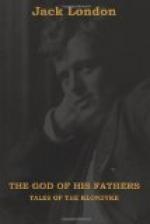“Ever hear of the Dead Horse Trail?”
He glanced up meditatively and Fortune shook his head, inwardly chafing at the delay.
“Sometimes there are meetings under circumstances which make men remember,” Uri continued, speaking in a low voice and very slowly, “and I met a man under such circumstances on the Dead Horse Trail. Freighting an outfit over the White Pass in ’97 broke many a man’s heart, for there was a world of reason when they gave that trail its name. The horses died like mosquitoes in the first frost, and from Skaguay to Bennett they rotted in heaps. They died at the Rocks, they were poisoned at the Summit, and they starved at the Lakes; they fell off the trail, what there was of it, or they went through it; in the river they drowned under their loads, or were smashed to pieces against the boulders; they snapped their legs in the crevices and broke their backs falling backwards with their packs; in the sloughs they sank from sight or smothered in the slime, and they were disembowelled in the bogs where the corduroy logs turned end up in the mud; men shot them, worked them to death, and when they were gone, went back to the beach and bought more. Some did not bother to shoot them,—stripping the saddles off and the shoes and leaving them where they fell. Their hearts turned to stone—those which did not break—and they became beasts, the men on Dead Horse Trail.
“It was there I met a man with the heart of a Christ and the patience. And he was honest. When he rested at midday he took the packs from the horses so that they, too, might rest. He paid $50 a hundred-weight for their fodder, and more. He used his own bed to blanket their backs when they rubbed raw. Other men let the saddles eat holes the size of water-buckets. Other men, when the shoes gave out, let them wear their hoofs down to the bleeding stumps. He spent his last dollar for horseshoe nails. I know this because we slept in the one bed and ate from the one pot, and became blood brothers where men lost their grip of things and died blaspheming God. He was never too tired to ease a strap or tighten a cinch, and often there were tears in his eyes when he looked on all that waste of misery. At a passage in the rocks, where the brutes upreared hindlegged and stretched their forelegs upward like cats to clear the wall, the way was piled with carcasses where they had toppled back. And here he stood, in the stench of hell, with a cheery word and a hand on the rump at the right time, till the string passed by. And when one bogged he blocked the trail till it was clear again; nor did the man live who crowded him at such time.




